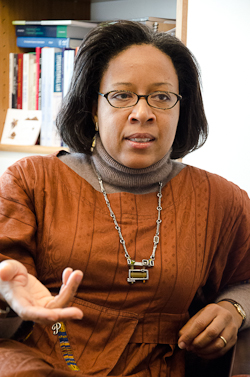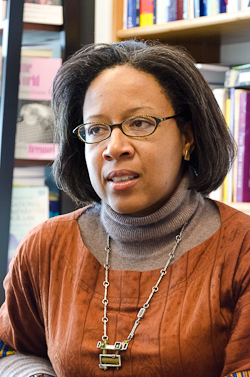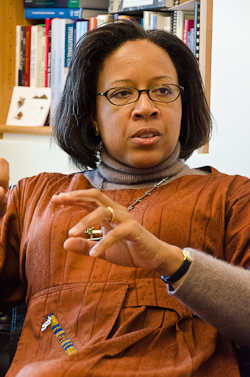
Professor Adelle Blackett works on the subject of work itself—specifically, ‘decent work.’ An Associate Professor of Law at McGill University, Blackett has taught labour and employment law, trade law, international development law, foundations of Canadian law and other courses at the Faculty since 2000.
Adelle Blackett was named a William Dawson Scholar in 2007. She is also the Director of McGill’s Labour Law and Development Research Laboratory (LLDRL), a steering committee member of the Labour Law Research Network (LLRN) and a research coordinator for the Centre de recherche interuniversitaire sur la mondialisation et le travail (CRIMT) at the Université de Montréal, where she looks at labour law, trade law and corporate social responsibility.
One of her long-term projects has been the creation of labour standards for migrant domestic workers. She was an independent expert to the UN’s International Labour Organization (ILO), whose 2011 Convention on ‘Decent Work for Domestic Workers’ Convention will come into force in 2013, and for whom she is now facilitating a labour code reform project in Haiti. Her forthcoming publications on the subject include a book on ‘Decent Work for Domestic Workers.’
In 2009, Blackett was appointed by the National Assembly to the Quebec Commission on Human Rights and Youth Rights. In 2010, she received the prestigious Bora Laskin National Fellowship in Human Rights Research, to pursue research in contemporary labour law.
In 2013, she will be working on a Haitian labour law reform project funded by Human Resources and Skills Development Canada through the ILO, in addition to many other ongoing projects. We caught up with Professor Blackett in the autumn semester, 2012, to find out more about her research.
Q. You’ve been working on “decent work” for domestic workers for 22 years now. How did you get started in this field of research, and where has it led you?
A. When I was a student here in the 1990s, I got together a group of law students who worked with the Association des aides familiales du Québec, and the Ministère de l’Immigration et des Communautés culturelles. The MICC, at the time, was trying to adopt a model contract applicable to household workers and their employers, which would include labour standards as they appear in the Act Respecting Labour Standards, but also be suggestive of the kind of conditions that are considered appropriate in domestic work. So we worked with the MICC to put forward that contract. Later, it inspired some of the language in the ILO Convention of 2011, and that has given me a personal sense of satisfaction.

But my concern with domestic work has been broader than thinking about international standards; it’s really been focused on improving the conditions of a group that has been historically and systemically discriminated against and who face a form of multiple disadvantage, by virtue of being migrants, of foreign nationalities, usually racialized women, working in an undervalued sector.
I’m at an interesting stage now, where I feel like I’m ready to think about alternative regulatory frameworks. And it’s a wonderful moment to be doing that.
Q. You were commissioned to write the ILO’s “Law and Practice Report” on decent work for domestic workers, which was presented at the 2010 International Labour Conference in Geneva. How did that come about?
A. The ILO first put this issue on their agenda in 2008, and I was called because I had worked on this topic for a long time, including at the ILO. They needed the rationale for a new convention, and they needed a report on law and practice around the world, and they needed it in a few months!
I worked on it while assuming my other responsibilities here at McGill. It was slightly insane. A number of students helped out as research assistants, and they were tremendous.
The case we made was that domestic work should be treated as work like any other, but also as work like no other. We made a human rights case for including domestic workers in the corpus of labour law, in a way that takes into account the specificity of domestic work.
For me, this was an opportunity to give real, substantive meaning to the notion of ‘decent work,’ a term coined by the ILO that had been heavily criticized for lacking any normative core. Also, it was a policy document, not an academic article, and that’s always fun for an academic, to produce a document that’s persuasive, that’s succinct, that isn’t heavily theoretical, but that does draw on theory in constructive ways.
Q. What role did you play in the actual drafting of the international convention at the UN?
A. First, I was commissioned to draft the questionnaire that would become the basis of the instrument. Then, the text was revised on the basis of delegates’ (governments, workers and employers) responses, and negotiated in month-long sessions in 2010 and 2011, at the ILO conferences in Geneva. I participated in both of those as an expert advising the committee devoted to decent work for domestic workers. But the role I played there was really behind the scenes, as the ILO and its experts took on a secondary role to what the constituents themselves wanted. It was really international law in the making. You could see, in the process, a growing awareness of what was wrong with the lens that so many people brought to thinking about traditional aspects of the domestic work relationship. Once you said ‘this is a work relationship that needs to be guided by labour law,’ certain arguments no longer followed.
Q. The Quebec Human Rights and Youth Rights Commission has seen many legal cases related to migrant domestic workers. How does this kind of work connect to your research?

A. My work on the Human Rights commission has been focused on many of the issues I’m reflecting on elsewhere—it brings it home and grounds it in a Quebec context. Panels of three commissioners see written submissions and decide which cases will go forward to the tribunal. I can’t comment on any of the cases, but I can mention that the ‘Avis’ (reports) that we put out on migrant workers, and on the proposed law on access to CSST by domestic workers, were pretty significant.
But the important piece about migrant work in Canada and Quebec is why workers are being brought in on a temporary basis without the automatic ability to become permanent residents in Canada, as was the norm in the past (even, initially, for domestic workers themselves). Is there actually a shortage of local workers, or is it that we are creating labour conditions that make the work undesirable by Canadian standards? It’s got very significant policy implications that have to be explored.
Q. The long-lasting ILO project was specific to domestic work. Has your research been mainly focused on this subject?
A. No, I’ve worked on labour law and development more broadly, focusing on labour law and the new economy. I’ve worked on international trade law and its interface with labour law, the relationship between labour law and human rights law, and codes of corporate conduct as labour regulatory devices.
My most recent research asks what is the idea of labour law, and how should we understand its relationship to the market? I also wrote on “Emancipation in the Idea of Labour Law” [in The Idea of Labour Law, edited by Davidov and Langille, Oxford UP 2011], where I question the industrial model as its historical starting point, and take my work back to different forms of exchange of labour, including slavery.
That allows me to bring in multiple forms of exchange of labour—free and un-free, bounded and unbounded, paid and unpaid—and to look at how they co-existed, rather than a linear progression—it’s a more complicated picture. And I think that complicated picture allows us to see how migrant workers can be very un-free, in the work they do, under certain conditions. And that, of course, allows me to integrate the work on domestic workers, but also, the new economy.
Interview by Bridget Wayland.
Photography by Lysanne Larose.
